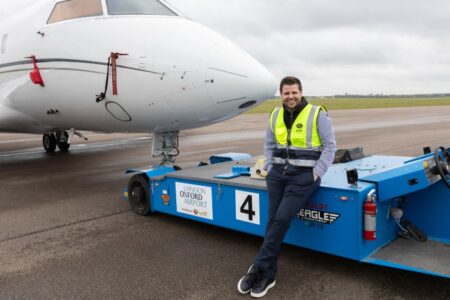by David Smith
FBOs are notorious for being stuck in their ways. They will store data on spread sheets rather than uploading to cloud-based software and there’s still a reluctance to share data with rivals for mutual benefit.
“FBOs are afraid to show their dirty laundry, in case it’s used against them,” says Marilena Sharpell, senior vice president of projects and communications at Global Aerospace, a UK-based company which provides aviation insurance. “Business aviation flight operators have overcome this fear and come together with the single goal of safety, but FBOs are way behind.”
Aviation companies take part in a number of data-sharing schemes, such as the Aviation Safety Information Analysis and Sharing (ASIAS) program in the USA. ASIAS holds regular round-table sessions and aggregates data. The potentially disastrous nature of aviation incidents has made it an imperative. But FBOs still risk major financial losses and injuries.
“We pay a lot of repeat ground-handling claims because FBOs make the same mistakes repeatedly. Data-sharing would help them to develop mitigation strategies,” says Sharpell.
Software as a service
Many FBOs are making use of management software to help recover from the pandemic. But there are plenty of antiquated legacy systems out there, according to Simon Underwood, product owner at management software company Myairops. He says, “Cloud-based software is filtering into the slightly larger European networks not already under big brands like Signature and Universal. But smaller independent networks often have lots of manual processes.
“We’re migrating one FBO network with more than 150 spread sheet lists. It’s a big task to centralize processes across numerous airports, borders and currencies.”
During the Covid-19 epidemic, software as a service (SaaS) came into its own, he adds. With traditional
on-premises software, the need to keep servers on site and install updates slows operations. Cloud-based products have a number of benefits. “The flexibility of SaaS means when it became necessary to track people at check-in who had done Covid-19 tests, we could update the software in one week,” says Underwood.
A further benefit of SaaS experienced during the pandemic was being able to monitor reductions in personnel efficiently. FBOs had to run with skeleton crews. Teams of three replaced teams of 15, single managers oversaw smaller sites. Cloud-based operations managed fast-moving staffing requirements effectively, says Underwood, as well as monitoring communications with immigration authorities and partner FBOs.
In the recovery period data analytics will be invaluable, Underwood believes. “Covid-19 has increased reliance on data analytics. FBOs, operators and business airports all need to understand how best to recover from the devastation,” he says. “That means getting a deeper understanding of trends and costs. Cloud-based software can monitor seasonal changes, and forecast demand.”
Touchless sales

In the USA the cloud-based approach of Mosaix Software had unanticipated advantages in the pandemic. CEO David Castaldo says the company – which supports more than 100 FBOs – moved recently to a no-touch approach for pilots. “Pilots today prefer using cellphones, or tablets, with a software app to make reservations and tell the FBO when they’re coming, how much fuel they need and what other services they require.
“We didn’t expect the pandemic, but allowing pilots to pay without opening their doors was an unplanned benefit.”
Tablet-based systems make fueling safer, adds Castaldo. There have been incidents when the wrong fuel was put into aircraft. “There’s the danger of destroying an airplane. Our line techs have access to our Ramp Fuel Board. When there’s a new order for Jet-A, the system can’t even accept it unless it’s locked into the Jet-A truck. FBOs can store it in their records,” he says.
According to Castaldo cloud-based aviation software is able to manage complex operations in detail best. FBOs don’t just rely on high-income passengers for revenue. Other services, such as hiring out private rooms, fuel sales and renting out hangars are integral. FBOs have to factor in outgoing expenses for everything from catering to emptying lavatories. “Software can determine if each component is making or losing money. You can run loss leaders, but figures must add up to a positive number.
“Our software will break it down by sector, or even building by building. Another benefit is storing information about customers online, including everything from their favorite food to where they like to stay.”
Visibility and integration
Many FBOs will be reluctant to invest in updating software after steep falls in revenue because of the pandemic. But Castaldo says failing to invest could make them “fat, dumb and happy” just moments before they pass away. Underwood agrees and says business aviation has traditionally been slow to adopt data analytics and invest in the infrastructure required to benefit from the software.
“Fueling costs are high and margins are tight. Larger airports have digital sensors that send real-time data to the operations centre. It helps track expenses. FBOs would benefit from the same level of day-today visibility,” Underwood says.
Cloud-based software will integrate data about everything from flight operations, to aircraft maintenance. Data from maintenance software, for example, can be fed into the flight operations software. “It allows operators to visualize scheduled maintenance,” says Underwood. “They can include predictive maintenance analytics, showing that a part is good for another 500 flight hours, but that it would be efficient and cost-effective to change it after 300 hours for instance. FBOs can also integrate safety management systems that pinpoint risks.”
Another significant trend for airports is to use aviation software to integrate holiday retailers and operators. Booking data merges with the airport management systems for check-ins and security.
The right culture

Insights from data analytics can remain closely guarded secrets, but emulating the flight world’s culture of openness could benefit everyone. However, a culture of openness is rare when FBOs are competing with rivals at larger airports. FBOs with a monopoly at smaller airports tend to be more open about rates and services. Even then, sharing safety management data is a rare phenomenon.
But there’s an even more fundamental problem to resolve before FBOs develop a sharing culture. It’s essential to develop a “just culture”, Sharpell says. Only in a
non-judgmental safe space will employees feel secure enough to admit mistakes.
“FBOs have not embraced the just culture. Operators often say that when an aircraft is damaged the FBOs promise to look into it, then fire someone and say it won’t happen again,” says Sharpell.
“That goes totally against a just culture. Rather than fire someone – let’s ask if their training has been adequate? Are the standard operating procedures hard to follow? A just culture is essential even before you get to the software and sharing data.”
To illustrate the benefits of a data-sharing culture, Sharpell gives the example of an FBO in California moving a Gulfstream aircraft. It’s a common source of mistakes and insurance claims, she says. “Small FBOs might be unfamiliar with larger airplanes. Will they know a G550 wing grows when you turn and you need extra clearance? And will they know a G450’s tail grows? If the industry shares experiences, mistakes will be far less common.”
Sharpell believes it is even more vital to report near misses. If these go unnoticed, they eventually cause accidents. “Let’s say an operative is moving an airplane and forgets they are wearing noise-cancelling headphones. He can’t hear the wing walkers and nearly hits a plane. It needs to be reported so FBOs can assess whether it’s individual, or systemic error. They can improve training, purchase more headsets or buy different batteries.”
The impetus for developing transparency has to come from the top. But it will confer competitive advantage, she says. Staff tend to respond positively to a trusting environment and staff turnover is lower. Meanwhile, an FBO that promotes a just culture and data sharing will attract business. “Most Gulfstream operators will go with the FBO that is open about safety operations rather than cheaper options,” she adds.
FBOs should settle on software that can anonymize data as it’s essential they trust operators not to use data against them. After that FBOs should take small steps towards developing a data-sharing culture.
“They can start by asking for a seat at the table for safety meetings at their local airport. They don’t even need to share anything. They can listen to the safety-conscious flight operators and see how they operate. Once they get an understanding of how powerful sharing data is, they’re more likely to share,” says Sharpell.
“It took the flight world ten years and the non-flight world can learn a lot from them. The culture has to be built from the top down and become part of the FBO safety policy. It goes hand in hand with embracing modern software and a just culture,” she adds.





